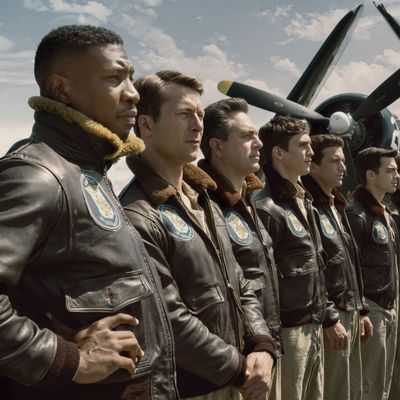
Devotion was made well before Top Gun: Maverick came out, but it’s hard not to be reminded of that movie – and, of course, the first Top Gun – in its opening scenes, which cut from sensuous close-ups of a Vought F4U Corsair fighter to the image of a bomber-jacketed Glen Powell, in full Cruisian glory, as he drives alongside a plane taking off from a runway and struts onto the Quonset Point air station on the coast of Rhode Island. But while it’s certainly nice to see Maverick’s scene-stealing “Hangman” back in the Navy, these opening moments feel more like a knowing nod to the kind of film Devotion will not be. J.D. Dillard’s poignant aviation drama establishes its own unique tone soon thereafter, as Powell’s Tom Hudner enters an empty locker room and hears a man’s voice in the bathroom bitterly muttering, “You ain’t worth shit.”
That voice belongs to Ensign Jesse Brown (Jonathan Majors), an accomplished flier with whom Hudner is paired early on, and who has, we learn, so absorbed the racism and hatred he’s faced over the years that he often repeats the insults to himself in the mirror, to get himself going. The year is around 1950, and war is brewing in Korea. To Strike Fighter Squadron 32, most of whom missed out on World War II (which they call “the Big Show”), the new conflict is a chance to prove themselves. But Brown stands apart from the others, not just because of his race but also because, as a family man, he has a life he’d like to return to. To his loving wife, Daisy (Christina Jackson), going abroad to war is not an opportunity for Jesse to serve but understandable cause for grave concern.
Devotion tells the fact-based tale of Brown and Hudner’s growing friendship as the “Fighting 32nd” ships out and finally faces aerial combat. It certainly works as a war movie, even if the moves are fairly familiar by this point. There’s the early tragedy to remind our heroes of the dangers of their job; there’s the boozy, chummy interlude on the French Riviera (where the men wind up partying with Elizabeth Taylor!); there’s the part where someone defies orders to engage in an act of heroism; there’s the ill-advised rescue mission. Devotion is based on a true story, and the obligatory roll call of archival photos at the end remind us that a lot of this stuff (including the run-in with Taylor) actually happened. But within the familiar often lie uncomfortable truths: A heroic act of defiance, for a Black soldier in 1950, can quickly become insubordination and, potentially, disgrace.
The film, to its credit, manages to make even its more predictable elements feel compelling and new in the moment. Dillard, who demonstrated his facility with suspenseful visual storytelling in the ingenious 2019 castaway thriller Sweetheart, brings confidence and authenticity to the aerial scenes, and the film’s climax, set during the Battle of Chosin Reservoir, is genuinely riveting. But again, one shouldn’t expect dazzling, Maverick-style spectacle here (even if the two films share an aerial stunt coordinator in the brilliant Kevin LaRosa Jr.). This is a smaller, more somber picture, where the suspense comes not from the machines but from the men.
That also makes it a tricky film, dramatically. Devotion gets something right about soldiers that a lot of war movies overlook for storytelling purposes: They are not the kind to wear their emotions on their sleeves. These are terse, restrained men, for whom control and discipline are everything. Perhaps more importantly, Brown has clearly learned the hard way not to really trust anybody. As a result, the relationship between him and Hudner, which starts off as a standoffish one and moves towards a sober loyalty, never really comes off as conventionally dramatic. This is not a shouty movie. That’s kind of the point: With these men, one has to read between the lines of what they say and do to understand how they really feel. There are stretches of Devotion where it doesn’t seem like all that much is happening, but then you look closer and you realize that just about everything is happening.
That requires a lot from the actors. Majors brings to Brown a brooding solitude – not just in his line readings and expressions but even in the way he carries himself. Whenever we learn something new about Brown, it feels like a heavy door has briefly opened, but only to reveal a sliver of light. Partly, it’s because this character has dedicated himself to something supposedly greater than himself – a military, a nation, a cause – and yet still has to hang onto his individuality, because the thing he’s given himself over to might not, on some level, be entirely deserving of his devotion.
Perhaps there’s an underlying duality to that title, too. It’s not a service or a flag that these men ultimately devote themselves to, but to one another. Powell’s performance, as a result, is largely reactive, as he’s slowly pulled into Majors’s orbit. It’s touching to see Hudner go from a wide-eyed, happy-go-lucky flyboy to someone more grounded, more compassionate, and maybe even more melancholy. War movies are often about their protagonists developing thousand-yard stares after going through the meat-grinder of battle. In Devotion’s case, it’s not so much the combat that gives these men their thousand-yard stares but rather the feelings they’ve had to endure.
More Movie Reviews
- The Accountant 2 Can Not Be Taken Seriously
- Another Simple Favor Is So Fun, Until It Gets So Dumb
- Errol Morris Has Been Sucked Into the Gaping Maw of True Crime


